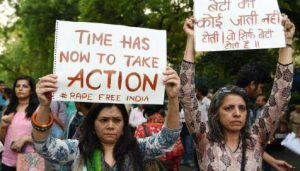
Indian demonstrators hold placards during a protest in support of rape victims, in New Delhi, April 15, 2018
India has always been a place of open and explicit discrimination based on gender, caste, class and religion. Since the hyper-capitalist, right-wing Hindu nationalist government of Narendra Modi and his Bharatiya Janata Party (Indian People’s Party) came to power in 2014, this discrimination has turned increasingly violent and fatal.
Hyderabad, September 2018: a Dalit* Christian man was hacked to death in front of his pregnant wife by a contract killer hired by the wife’s father. The father, a jeweler, had been opposed to the marriage.
South India, March 2016: Another Dalit man was hacked to death in broad daylight in front of his upper-caste wife, by contract killers hired by the wife’s father.
Rohtak, North India, August 2018: An 18-year-old upper-caste Jat woman was shot dead in front of the district court while under police escort, by her own family. She had eloped with a Dalit man from a neighboring village. The upper-caste dominated village council in her village issued a diktat which prevented her remains from being brought back to her village.
The most gruesome rape and murder in recent memory was that of 8-year old Asifa Bano in Indian-occupied Kashmir. Asifa Bano belonged to a nomadic Muslim community of herders known as the Bakarwals. Hindu families had accused the herders of grazing cattle on so-called private property.
In January 2018, Hindu men kidnapped Asifa Bano while she was grazing her horses. They drugged her, held her in a temple and raped her for three days. Then they killed her and disposed of her body in the forest. The local police helped cover up the killing.
Once her body was discovered, the accused were arrested. In a grotesque turn of events, Hindu lawyers protested, not the rape of an 8-year-old Muslim girl, but the arrest of the men accused of rape! A mob of Hindu lawyers even tried to physically stop police from going to court to file charges against the accused.
Thousands of such killings, disgustingly termed “honour killings,” have been documented. Every year in India there are at least 1000 such murders.
It is not uncommon for killings to go unreported since the state apparatus in India, from the police force to the judiciary, is dominated by upper-caste Hindu men. They have no incentive to change the socio-economic status quo. While there has been an increase in upper-caste violence against Dalits, the number of convictions against the upper-castes has dropped. Since Modi’s election, a Hindu upper-caste dominated judiciary has made it harder to prosecute crimes against Dalits.
Seventy years after India’s independence, only 5% of marriages in India are inter-caste. The material basis for this, and for caste and religious discrimination, are private property relations. In India, property ownership is and has always been, disproportionally in favor of upper-caste Hindu males.
Upper-castes own on average more than twice the assets of Dalits, Muslims and tribal people. Even when Dalits and minorities hold land, the average holding is 2 to 20 times smaller than the land holdings of upper-castes.
Before 2005, inheritance laws used religious-based cultural practices as a basis for inheritance. In 2005, these laws were amended to guarantee Hindu women a share equal to that of their male siblings. It gave them complete control over their own property regardless of whether property was acquired through inheritance or other means. Thus, inter-caste and inter-religious marriage would lead to a dilution of the assets of the Hindu upper-castes. This, along with the immunity guaranteed by a corrupt, capitalist, right-wing Hindu nationalist government, has fueled a backlash even against such a low rate of inter-caste marriage.
As elections approach in 2019, the great hope of capitalist democracy is to replace one capitalist government by another while preserving the material relations that allow increasingly fatal discrimination. But democracy is a great illusion for the masses!
Only in a communist society, in which private property has been eliminated, can discrimination cease. In a communist society, ownership of land and assets will be absolutely unnecessary. There will be plenty to satisfy everyone’s needs. The means of production will be controlled by the working classes and ensure a peaceful world for all living beings.
*Dalit is the term used for the members of the lowest caste in the Hindu caste hierarchy
Front page of this issue

